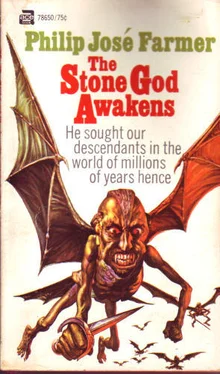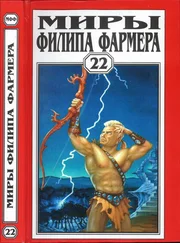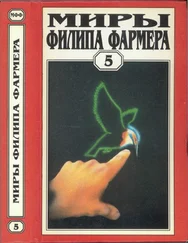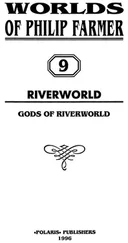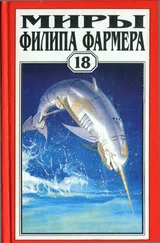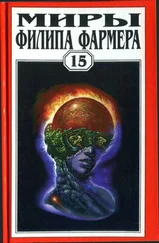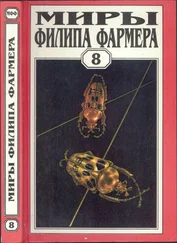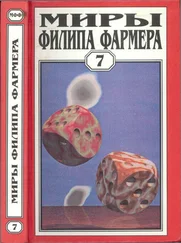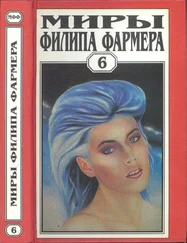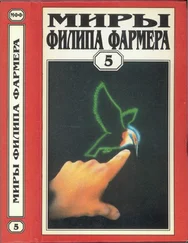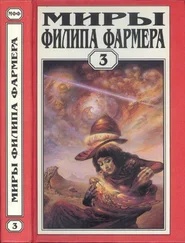Ulysses' credit went up even higher. The main effect of the raid, however, was to cause the humans to realise that they must fight on the side of the Neshgai, not against them, for the time being. The bat-men had dropped messages to the effect that they intended to exterminate both Neshgai and their human allies.
It was a cool dawn with a clear sky and a six-mph breeze from the sea when the first of the ten dirigibles rose into the air. The flagship, theVeezhgwaph (Blue Spirit), was four hundred and thirty feet long and had a diameter of sixty feet. Its skin was silver, and on its bow a hideous demon was painted in blue. The control gondola was suspended underneath the bow, and three motor nacelles hung from each side. Its hollow interior contained a skeleton made of very lightweight vegetable husks stitched together, the keel, main walkway, catwalks, storage cells and ten gigantic gas ballonets. On its top were four cockpits with archers, catapult men, rocketeers and hawk trainers. Along each side, at the midline, were blisters in which sat catapult and rocket men. Other openings gave access to arrows and bombs to be shot out, and to hawks. The tail structures contained several cockpits and there were openings along the bottom of the dirigible behind which were more projectile men and bird handlers.
There were also bomb hatches and hatches for releasing anchors and grappling hooks.
Ulysses stood on the bridge, the lower desk of the control gondola, behind the helmsman. The radiomen, the navigators, the officers responsible for relaying orders from various parts of the ship, and several archers were also in the gondola. If there were not so many Neshgai, Ulysses thought sourly, they would have had more room on the bridge.
He walked through the crowd to the rear of the gondola and looked out. The other ships were behind him but drawing up swiftly. The last was only a round glitter in the blue, but it would catch up within an hour, and they would then proceed in formation.
The beauty of the great ships of the air, and the idea that they were his creation, made his breast ache. He was very proud of them, even if he knew that they were now more vulnerable than he had originally thought. The bat-men could fly above the dirigibles and drop bombs on them. They would not be able to do that, however, until he went down to a lower altitude. The ships were climbing now and would not stop until they reached thirteen thousand feet. The air was too thin here for the bat-men to fly. They would not be able to get close to the dirigibles until these descended over their target.
Their goal was the approximate centre of The Tree, if they could believe their informants. Pain was a great destroyer of lies, and the bat-men taken prisoners on the first and the second raids had been subjected to as much pain as their frail bodies could withstand. Two had held out until they died, but the others had finally told what they swore was the truth. Their stories agreed, which still did not mean that they were true.
The bat-men who could still talk were being taken along so that they could identify tree marks and, finally, the base-city.
Below, The Tree was a horizon-spanning tangle, a criss-cross of grey branches and sun flashing off the waterways on their branches here and there, and vivid colours of the trees and bushes which grew on The Tree. Once, a pale pink cloud rose from a dense green jungle. It was an immense flock of birds leaving the vine complex between two mighty branches. The pink cloud passed between a number of trunks and then settled down and was hidden inside another vine complex.
Ulysses turned in time to see Awina come down the ladder from the upper deck of the gondola. She was beautiful when just resting, as beautiful as a seal point Siamese in repose. But when she was moving, she was as pleasing to the eye as the wind would be if it could be seen. Now that Thebi and Phanus were not with them and she was the only one to attend to the Lord's personal needs, she was all grin and purr. He had thought of asking her to stay behind but had decided not to. She knew that their chances for coming back were about twenty to eighty, if that good. She would be hurt if he asked her to stay behind. And there was a good strong possibility that she would brood until she exploded against the two women, since she would blame them.
She wore the goggles which Ulysses had ordered made as part of the air force uniform. They would not be needed very often, if at all, but he liked them. They gave a distinct flair to the men who rode the ships of the sky, and they also gave him a pleasurable nostalgic twinge when he saw them. He had been a World War I aviation buff.
A leather chain with a bright blue symbol in the form of the Maltese cross at its end hung around Awina's neck. A belt with a stone knife was around her waist. That completed her uniform.
She looked at him to make sure that she would not be interrupting him in anything and she said, "My Lord, this is much better than climbing up and down The Tree and riding rafts among the snoligosters and the hipporats!"
He smiled and said, "That is true. But do not forget that we may have to go on foot on the way home."
And consider ourselves lucky to be able to do that, he thought.
Awina moved closer until her hip was brushing him and then the side of her shoulder came into contact with his arm. The tip of her tail twitched across the back of his calves now and then. There was too much noise in the gondola for him to hear her purring, and she was not close enough for him to feel it. But he believed that she was purring.
He moved away. He had no time to think about her. Captaining ten ships was a full-time job. The officers and crews had had as much training as he could give them in the little time allowed. But they were not veterans.
So far, things had run smoothly enough. At this altitude, they had a tail wind which was upping their ground speed to fifty miles an hour. This meant that they could not return at this height; they would have been moving backward while their motors strained to go full speed. But now they could reach their target in eight hours instead of the sixteen it would have taken if the air had been still. He would let the motors rest for several hours and be pushed by the wind, so that would bring them to the Dhulhulikh city about two hours before nightfall. That would be enough time for what he had in mind.
The Tree scudded under them like a great grey-and-green cloud. Occasionally, there was a space where the branches did not cross, and he could almost see to the bottom of the abyss. What a colossal being! The world had never known its like. Not in all the four billion years of its existence. Not until about, he estimated, the last twenty thousand years. And here it was: The Tree. It seemed a shame, a tragedy, rather, to destroy such a creature.
Then he caught himself. Who was going to destroy it? How?
Now and then, he saw tiny big-winged figures that had to be Dhulhulikh. They knew that the ships of the stone god and the Neshgai were flying toward their city. Even if he had not seen any, he would have taken it for granted that there were leathery-winged pygmies hidden in the foliage, observing the ten silver needles above them. Nor did they have to send couriers. They would long ago have transmitted messages via the pulse-diaphragms and nerve cables of The Tree itself.
He supposed that they had been aware for a long long time that the ships were destined for their base-city. They had enough spies, and they doubtless had bribed slaves and perhaps even some Neshgai to spy for them. Corruption and treachery seemed to be inherent with sentiency. Humans had not had a monopoly on these.
Awina pressed up against him again, and he lost his sequence of thought.
The hours passed, eased by the demands of commanding the fleet. Below, the scene changed only slightly. There was some variety in the unity, but only in the slightly differing directions the branches took, in the varying configurations of vine-complexes, the lesser or taller heights of the trunks, and an occasional cloud of birds: pink-green, scarlet, purple, orange, yellow, that sped between the trunks and over the branches.
Читать дальше
